In the complex world of fungi, few genera capture our imagination and curiosity quite like Cordyceps. Cordyceps is a genus of parasitic fungi widely recognized for its unique life cycle and medicinal properties, particularly in traditional Asian medicines. Despite some misconceptions, Cordyceps is not typically associated with psychedelic or psychoactive properties.
The confusion often arises due to a mistaken association with other fungi, such as 'magic mushrooms' (Psilocybe genus), which contain the psychedelic compound psilocybin. However, the scientific literature does not support Cordyceps having psychedelic properties.
Yet, it's essential not to let this clarification undermine the multifaceted nature of Cordyceps and its potential health benefits. Much like their more psychedelic cousins, Cordyceps contain bioactive compounds that have been shown to influence human health in various beneficial ways. This article will delve into the intricate world of Cordyceps, dispel some of the myths surrounding its psychedelic properties, and highlight the unique attributes that make it a subject of ongoing research and intrigue.
The Enchanting World of Cordyceps
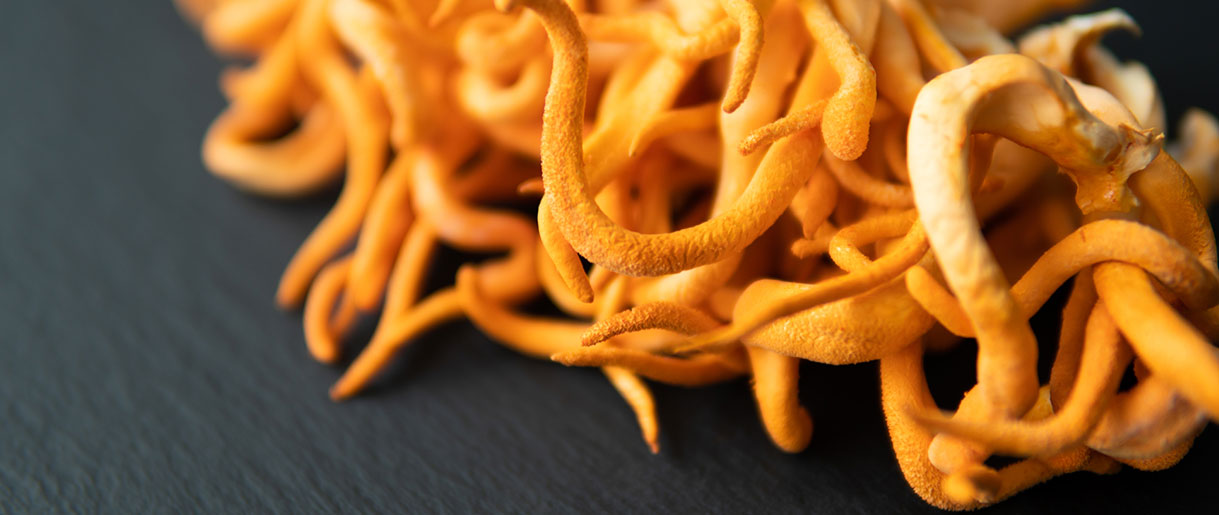
An Introduction to the Cordyceps Genus
Cordyceps is a fascinating genus of fungi that includes over 400 recognized species. Cordyceps sinensis and militaris are the most commonly known and studied.
Cordyceps mushrooms, often called "functional mushrooms," are renowned for their unique lifecycle and exceptional health benefits, far from the misnomer "cordyceps psychedelic." These cordyceps species have a deep-rooted history in traditional Chinese medicine and have been revered as potent Chinese herbs for centuries.
The Intriguing Lifecycle of Cordyceps Mushrooms
The lifecycle of cordyceps mushrooms is a true spectacle of nature. Often starting their lives as tiny spores, these fungi make their homes within the bodies of insects. As the cordyceps mushrooms grow, they replace the host tissue, eventually leading to the host's death. When the cordyceps mushrooms mature, they sprout from the host's body to reproduce, completing their eerie yet fascinating life cycle.
Ophiocordyceps sinensis, commonly mistaken for cordyceps sinensis, is one such species. This cordyceps mushroom is specifically known to infect caterpillars in high-altitude regions of China, making it one of the unique members of the Cordyceps genus.
But despite its intriguing life cycle, no psychedelic properties have been attributed to Ophiocordyceps sinensis or any other Cordyceps species, including Cordyceps militaris.
Cordyceps in Traditional Medicine: From Cordyceps Sinensis to Cordyceps Militaris
Cordyceps mushrooms, specifically Cordyceps sinensis and Cordyceps militaris, are essential in traditional Chinese medicine. Contrary to the misleading term "cordyceps psychedelic," these mushrooms have been used for their potential therapeutic properties for hundreds of years.
The benefits of cordyceps, particularly of Cordyceps sinensis and Cordyceps militaris, are extensive. For instance, these functional mushrooms are believed to support the immune system, perhaps one of the most lauded benefits of cordyceps. Furthermore, cordyceps mushrooms have been traditionally used to combat chronic fatigue disease and chronic kidney disease, among other ailments.
Cordyceps militaris, another commonly used cordyceps mushroom, has similar potential benefits. Like Cordyceps sinensis, Cordyceps militaris is also reputed to bolster the immune system and provide various other health benefits. This cordyceps mushroom improves kidney health and also fights fatigue.
The Psychedelic Realm: An Exploration Beyond Cordyceps

The Labyrinth of Psychedelics
The term "psychedelic," derived from the Greek words for "mind revealing," refers to substances known to produce changes in perception, mood, and cognitive processes.
Contrary to the misnomer "cordyceps psychedelic," the world of psychedelics is distinct, primarily comprising certain biologically active compounds found in various plant species and fungi, but not Cordyceps. These substances are noted for their potential to induce psychedelic or hallucinogenic effects, profoundly altering one's consciousness.
A Closer Look at Commonly Known Psychedelics
Among the myriad substances categorized as psychedelics, a few stand out for their prevalent use and well-documented hallucinogenic effects. For instance, psilocybin, a compound found in over 200 species of mushrooms (not including the Cordyceps genus), is known for its strong psychedelic effects.
While the term "cordyceps psychedelic" is often used, it's important to clarify that no species of Cordyceps has been scientifically proven to produce psychedelic or hallucinogenic effects. The hallucinogenic effects associated with psychedelics are primarily linked to psilocybin, LSD (lysergic acid diethylamide), and mescaline.
The Multifaceted Impact and Potential of Psychedelics
The effects of psychedelics are as varied as the substances themselves. When consumed, these biologically active compounds can result in a broad spectrum of experiences, from heightened sensory perception and emotional shifts to profound existential or spiritual insights. But it's not just the psychedelic or hallucinogenic effects that interest researchers.
Increasingly, the potential therapeutic uses of psychedelics have become a significant area of scientific investigation. Some studies have suggested(1) positive effects on mental health, particularly in cases of treatment-resistant depression, PTSD, and anxiety associated with terminal illnesses.
For instance, recent research has indicated that psilocybin acts on the brain's adenosine receptors, potentially helping alleviate symptoms of certain mental health conditions.
Cordyceps and Psychedelics: Demystifying the Connection
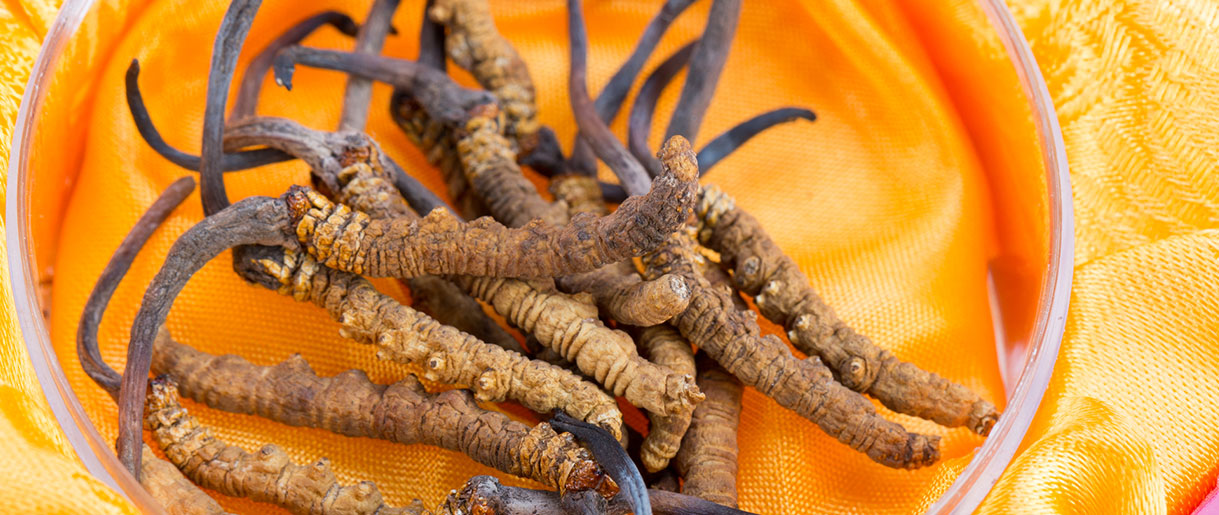
Researching the Psychoactive Landscape of Cordyceps
The term "cordyceps psychedelic" has gained traction, leading to curiosity and misconceptions about the psychoactive properties of Cordyceps. Research has been conducted on Cordyceps mushrooms, notably Cordyceps Sinensis and Cordyceps Militaris, for their many active ingredients and potential health benefits.
Cordyceps Sinensis, often known as the caterpillar mushroom, has been analyzed for its polysaccharides, among other active ingredients. Similarly, Cordyceps Militaris has been the subject of various studies. Despite thorough research, no solid evidence indicates any psychoactive properties associated with taking Cordyceps.
The Great Confusion: Cordyceps vs. "Magic Mushrooms"
The confusion regarding "cordyceps psychedelic" primarily stems from the misunderstanding that all mushrooms may have psychoactive effects. Cordyceps mushroom, however, is fundamentally different from "magic mushrooms," which are known to contain psilocybin, a psychoactive compound.
Cordyceps Sinensis, Cordyceps Militaris, and other Cordyceps species have distinct biochemical profiles. While they contain a range of biologically active compounds such as polysaccharides and beta-glucans, they do not produce psychoactive effects in humans.
Expert Opinions and the Current Scientific Consensus
Leading researchers and experts in the field maintain that Cordyceps mushrooms, including Cordyceps Sinensis and Cordyceps Militaris, do not possess any psychedelic properties. Taking Cordyceps is associated with many potential benefits, but inducing psychoactive effects in humans is not one of them.
As of now, the scientific consensus dismisses the notion of "cordyceps psychedelic" as misinformation. While there is always more to explore and understand about these fascinating fungi, current knowledge distinctly separates Cordyceps from the realm of psychedelics.
Cordyceps: A Trove of Potential Therapeutic Benefits
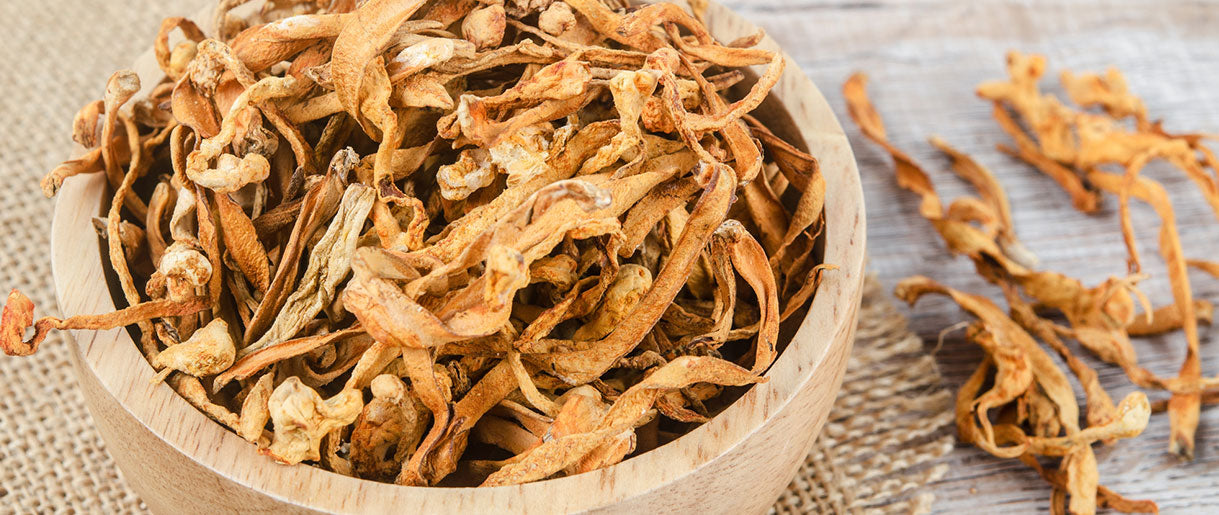
Harnessing the Non-Psychedelic Therapeutic Properties of Cordyceps
While the misnomer "cordyceps psychedelic" can mislead, the potential therapeutic properties of cordyceps mushroom truly grab the scientific community's attention. Various studies have explored the health benefits of cordyceps, with findings highlighting their impact on several key health areas.
For instance, the cordyceps mushroom is often lauded for its potential to support the immune system. This ties in with the mushroom's purported anti-inflammatory properties, which may help reduce inflammation. Cordyceps also enhance energy levels, relieving chronic fatigue syndrome and providing more energy for everyday activities.
Other possible benefits of cordyceps include support for liver function, with some research suggesting that(2) it could benefit individuals with liver disorders such as liver cirrhosis. Cordyceps mushroom's antioxidant activity and potential benefits for chronic conditions like chronic bronchitis have also been studied.
Moreover, cordyceps promotes weight loss and improvements in athletic performance, which might be linked to the energy-boosting properties of this fascinating fungus.
Drawing Comparisons: Cordyceps vs. Psychedelics
Regarding therapeutic benefits, cordyceps mushroom, and psychedelics could not be more different. While psychedelics such as psilocybin have been studied for their potential to treat mental health disorders like depression and PTSD, the benefits of cordyceps primarily focus on physical health.
The potential of cordyceps mushroom to support the immune system, improve energy levels, and provide anti-inflammatory benefits sets it apart from the mental health-oriented benefits often associated with psychedelic compounds.
Cordyceps and Psychedelics: Responsible Use and Safety Considerations
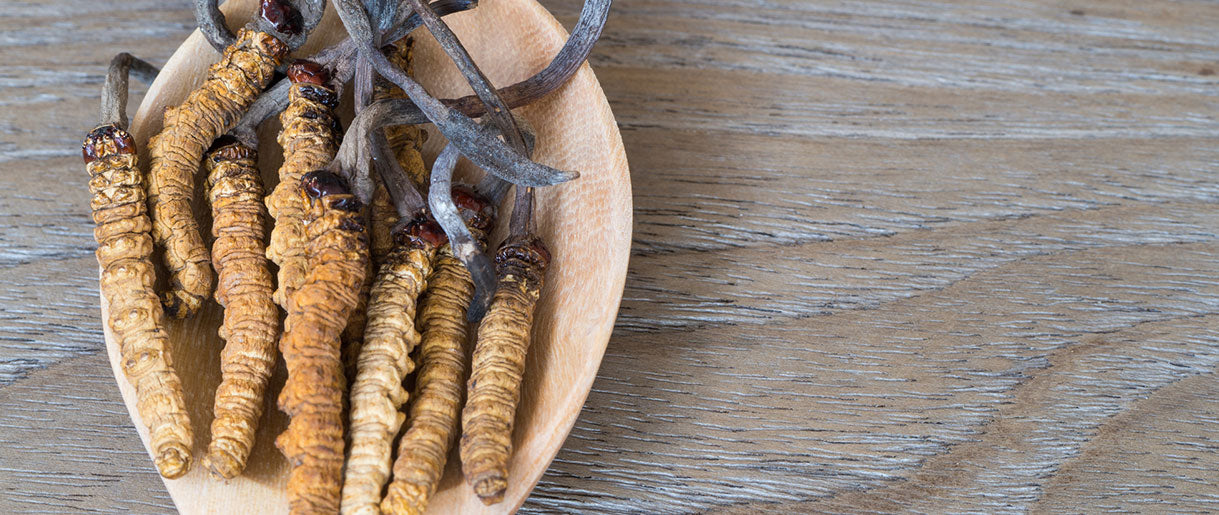
Guidance for Cordyceps and Psychedelics Usage
Before using cordyceps supplements, cordyceps powder, cordyceps extract, or cordyceps tea, it's critical to seek the guidance of a healthcare provider or a qualified herbalist. Similarly, although many fungi have been recognized for their therapeutic benefits, consuming psychedelics should also be done under professional supervision or guidance due to their powerful psychoactive effects.
These precautions are necessary because everyone's body responds differently to these substances. It would help if you accounted for factors such as potential allergies, interactions with other medications, and individual tolerance levels. Moreover, talking to a doctor can help you determine the proper cordyceps dosage, helping you reduce the risk of side effects.
Ensuring Safe and Informed Consumption
When considering using a cordyceps supplement or any form of cordyceps, be sure to purchase from reliable sources. Many fungi, including cordyceps, are available in various forms, like cordyceps powder, cordyceps extract, and cordyceps tea. However, quality and potency can vary widely among manufacturers.
This is why it's crucial to select products that have been tested for purity and potency. When dealing with cordyceps capsules or any form of cordyceps, you want to ensure you are getting a safe, high-quality product.
Additionally, it's essential to follow the recommended dosages for cordyceps supplements. While cordyceps is generally considered safe, overconsumption can lead to potential side effects, such as upset stomach or diarrhea.
Legal Considerations and Current Regulations
Understanding the legal status and regulations related to cordyceps and psychedelics is another critical aspect of responsible use. The sale and use of cordyceps supplements, cordyceps powder, cordyceps extract, and cordyceps tea are legal in many countries, with specific regulations regarding their manufacture and sale.
In contrast, many psychedelic substances, including fungi, are classified as controlled substances in numerous jurisdictions due to their potent psychoactive effects. It's crucial to familiarize oneself with the regulations in your locale before obtaining and using these substances.
FAQs About "Is Cordyceps Psychedelic?"
How Do Cordyceps Make You Feel?
Cordyceps are known for their potential health benefits, although individual experiences can vary. They are not psychedelic, so they don't induce altered states of consciousness.
Many people report increased energy and reduced fatigue, possibly due to cordyceps' potential to enhance oxygen utilization. Improved immunity is another commonly cited effect, likely due to its antioxidant content. Some users also mention enhanced athletic performance, better respiratory function, and a sense of relaxation or stress relief.
Is Cordyceps Good For Depression?
While there's some preliminary evidence that cordyceps might have potential benefits for mental health due to its possible adaptogenic and anti-fatigue properties, there's no robust, definitive research directly linking cordyceps to the treatment of depression. Most existing studies have been conducted in animals or in vitro; human studies are limited and not specific to depression.
Adaptogens are substances that are thought to help the body resist different types of stress, and some research suggests that cordyceps may have adaptogenic properties. Additionally, cordyceps could indirectly improve mood and well-being by reducing fatigue and boosting energy levels.
Does Cordyceps Lower Testosterone?
The current evidence suggests that Cordyceps may have the opposite effect—potentially boosting testosterone levels rather than lowering them.
Cordyceps sinensis, one of the most widely studied species, has been traditionally used in Chinese medicine to improve vitality and sexual health—cordyceps improved libido in both males and females.
Some animal studies have shown that Cordyceps may increase testosterone production, enhancing libido and sexual performance. However, more research, particularly human studies, is needed to confirm these effects.
Key Takeaways
We've traversed an intriguing journey from exploring the world of Cordyceps medicinal mushrooms to delving into psychedelics. We learned that, though mystifying and unique, cordyceps do not have psychedelic properties. As part of traditional Chinese medicine, these functional mushrooms, especially Cordyceps sinensis and Cordyceps militaris, have been used for their potential to bolster the immune system, improve energy levels, and contribute to overall wellness.
On the other hand, psychedelics like psilocybin have distinctive hallucinogenic effects, yet they also share an interest in the medical and scientific communities due to their potential therapeutic uses.
The intersection of Cordyceps and psychedelics may seem paradoxical, given the former's lack of psychedelic properties. However, both lie within the broader context of exploring nature's profound potential for human health and well-being. This intersection also highlights the significance of separating scientific facts from internet-based misinformation, particularly the erroneous association of cordyceps with psychedelic effects.
Now, it's your turn to weigh in on the topic. What do you think about the potential benefits of Cordyceps and psychedelics? Do you have personal experiences or additional insights you'd like to share? We invite you to leave a comment below and join the conversation. Together, we can continue exploring and learning from these fascinating natural world aspects.
References
- Hallucinogens in Mental Health: Preclinical and Clinical Studies on LSD, Psilocybin, MDMA, and Ketamine, (1)https://www.ncbi.nlm.nih.gov/pmc/articles/PMC7880300/
- Cordyceps militaris alleviates non-alcoholic fatty liver disease in ob/ob mice, (2)https://www.ncbi.nlm.nih.gov/pmc/articles/PMC3988506/




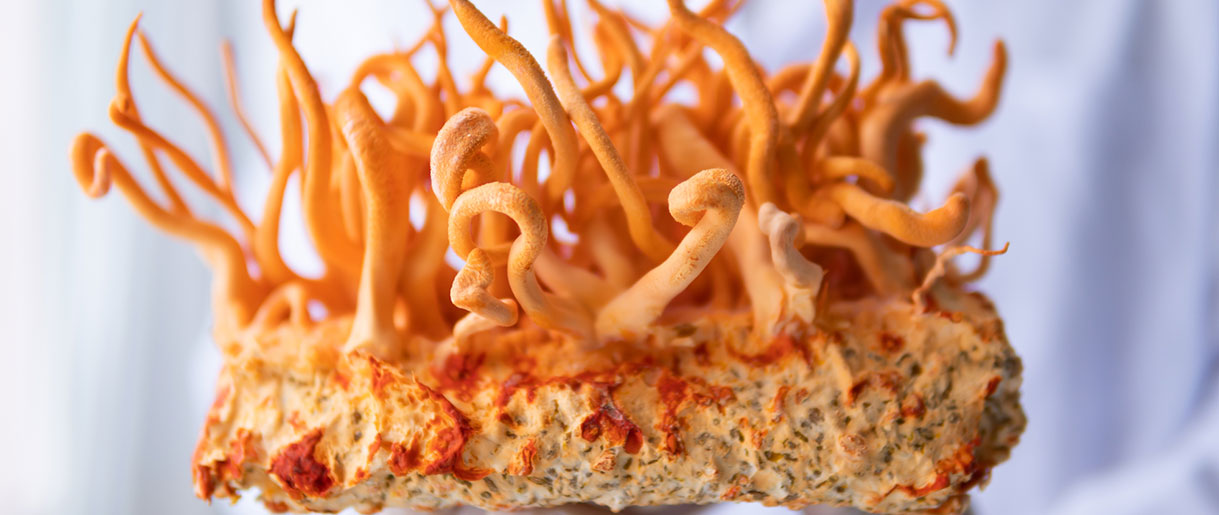

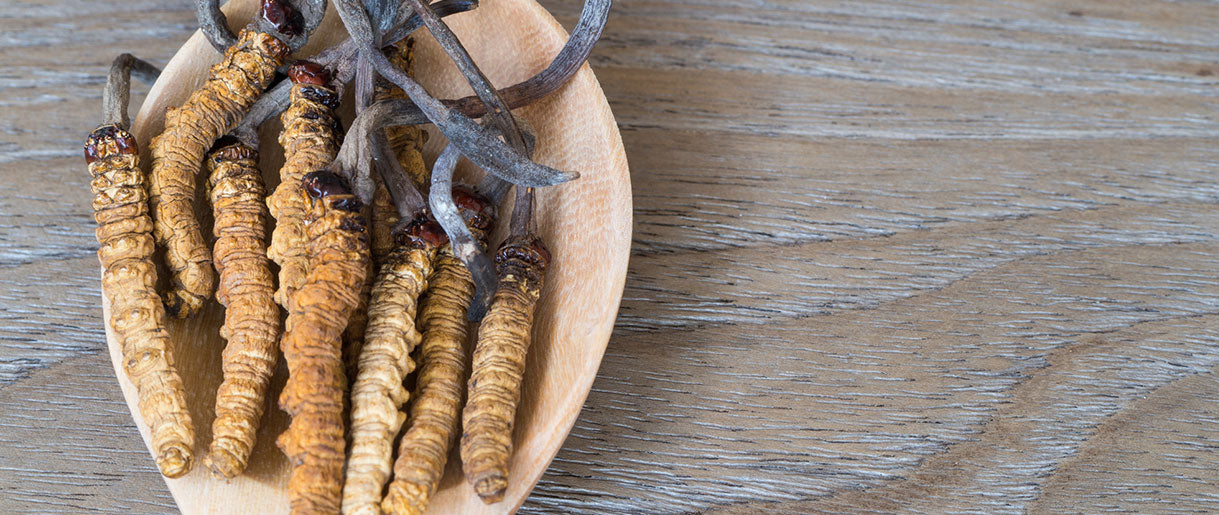



Let Us Know Your Comments